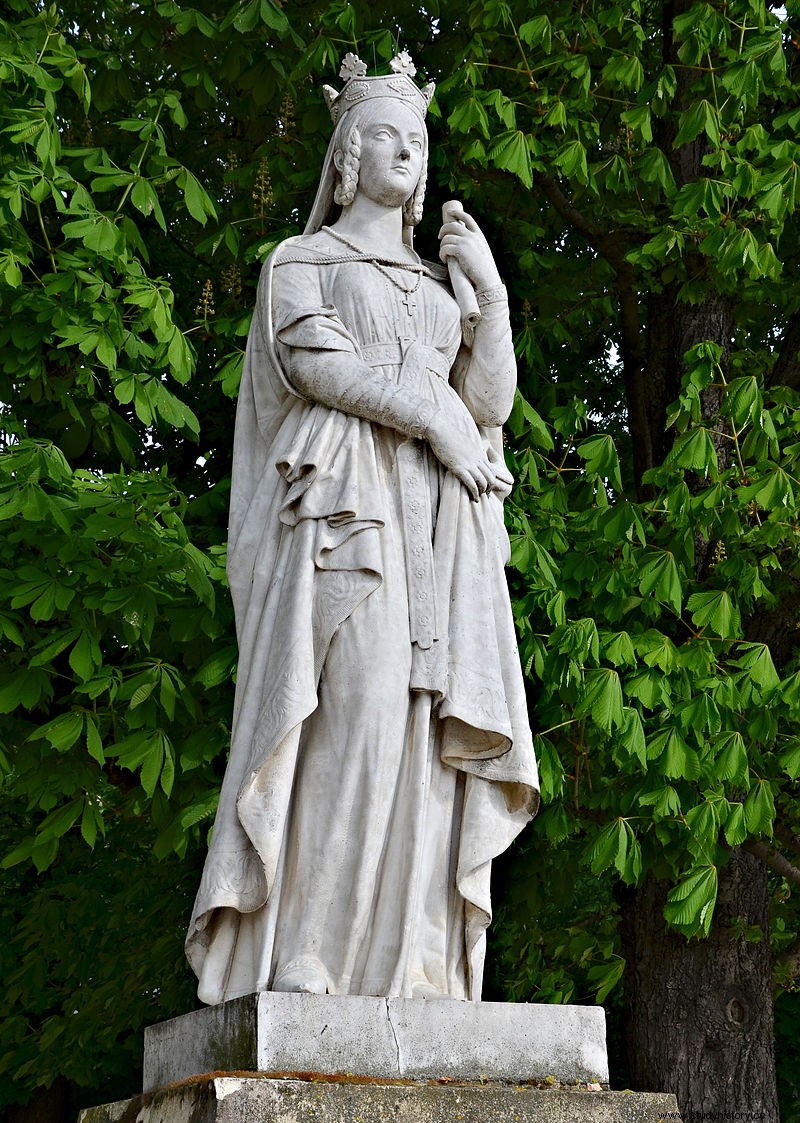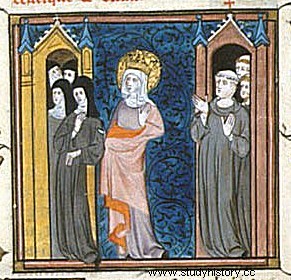Slave who became queen of the Franks, Bathilde (circa 630 – 680) influences the policy of the kingdom and then exercises the regency. She strives to keep the peace and bans the sale of slaves on her land.
A child slave
The main source concerning the life of Bathilde is the Vita sanctæ Bathildis (Life of Saint Bathilde), an anonymous hagiography written shortly after her death and of which later edited versions exist.
According to the Vita , Bathilde arrives on the territory that is then still called Gaul as a slave, “sold for a low price”. She is probably descended from the Saxons of Anglo-Saxon England, and of modest origins. Later versions of Bathilde's life lean on the contrary to a more aristocratic, even royal origin:". (This lady came from Saxony and was of royal line; she was captured in her youth by miscreants). Nothing confirms this more incredible hypothesis.

From servant to queen
Bathilde is bought by Erchinoald, mayor of the palace of the Frankish kingdom of Neustria; the highest dignitary after the king, the mayors of the palace experienced at the time a growing influence on the politics of the Frankish kingdoms. Erchinoald makes Bathilde, still a teenager, his servant; the Vita mentions that she serves him drinks in his room, revealing that she has a special status in his household. The texts describe her as humble, pious, benevolent, beautiful and graceful.
After the death of his wife, Erchinoald would have liked to marry Bathilde, who hides to escape him. He marries another woman. To strengthen his political position, he presents or even offers his servant to the young Frankish king Clovis II, son of Dagobert I st . Their marriage, possibly in 649, made the former slave queen of the Frankish kingdoms of Neustria and Burgundy. From their union were born five children, including Clotaire III, Childeric II and Thierry III.
Queen and Regent
Described as a wise and cultured queen by the Chronicle of Fredegaire, Bathilde works to support the Church and to help those most in need. The life indicates that she takes care of priests and the poor, feeds the needy, clothes the destitute, donates large sums to the Church, founds convents and monasteries. She surrounds herself with clerical advisers, including her chaplain Genes de Lyon who will become a bishop, and bishops Chrodobert, Saint Ouen and Saint Éloi.
Clovis II died in 657. His eldest son Clotaire was then only five years old, and Bathilde exercised the regency for him alone so as not to divide the kingdom between his children. In Austrasia, however, the reign of Childebert III the Adopted is contested by some of the greats of the kingdom. To preserve the unity of the Regnum Francorum , Bathilde lets her second son, Childeric, accede to the throne of Austrasia. He was then only eight years old; it is under the tutelage of the mayor of the palace Wulfoald that he reigns . The life mentions the influence of the queen on the peace and unity of the kingdom:
"We believe that these three kingdoms have remained in peace thanks to the great piety of Lady Bathilde and the will of God".
In the fight against slavery
A slave who became queen, Bathilde works to fight against slavery, condemned by the Church. It prohibits the sale of Christian slaves on the lands of the kingdom of the Franks; she herself redeems captives whom she frees or brings into the monastery.
Bathilde opposes the principle of tax paid according to the number of people in a household, a rule which has dramatic consequences:newborn babies are sometimes left to die, for lack of being able to pay the tax, and heads of families end up in prison for debt, depriving their households of income. Bathilde freed many tax prisoners.
Attached to the Church and to the respect of the rules, the queen works finally to fight against simony:the sale and the purchase of goods, sacraments and religious offices.
Saint Bathilde
 Bathilda's last known political act dates from 664 and concerns Corbie Abbey, which she recently founded. She left power without anyone knowing the reason, but in a probably violent political climate; one of his advisers, the bishop of Paris Sigebrand, was assassinated around 665.
Bathilda's last known political act dates from 664 and concerns Corbie Abbey, which she recently founded. She left power without anyone knowing the reason, but in a probably violent political climate; one of his advisers, the bishop of Paris Sigebrand, was assassinated around 665.
Bathilde retired to the Abbey of Chelles, which she founded after her husband's death. From slave to queen, she then became a simple nun with Abbess Bertille, whom she herself placed in this position. After her last years in the service of the abbey and the poor, she died of illness in January 680 or 681.
A cult quickly developed around Bathilde, centered around the abbey of Chelles, where Carolingian princesses became abbesses. She was canonized in the 11th century by Pope Nicolas II.
